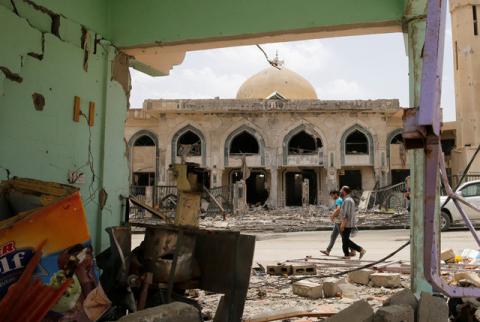Advertisement
Iraqi commander says to complete capture of Mosul in May
BAGHDAD (Reuters) - An Iraqi commander expects to dislodge Islamic State from Mosul in May despite resistance from militants in the densely populated Old City district.
The battle should be completed "in a maximum of three weeks", the Iraqi army's chief of staff, Lieutenant General Othman al-Ghanmi, was quoted as saying by state-run newspaper al-Sabah on Sunday.
A U.S.-led international coalition is providing air and ground support for the offensive in Mosul, the largest city in northern Iraq, which fell to hardline Sunni Muslim fighters in June 2014.
Islamic State has lost most of the city's districts since the offensive began in October and is now surrounded in the northwestern districts, including the historic Old City center.
The United Nations believes up to half a million people remain in the area controlled by the militants, 400,000 of whom are in the Old City with little food and water and no access to hospitals.
The militants have dug in between the civilians, often launching deadly counter-attacks to repel forces closing in on the Old City's Grand al-Nuri Mosque, from where Islamic State leader Abu Bakr al-Baghdadi declared a caliphate over parts of Iraq and Syria.
The hardline group persecuted non-Sunni Muslim communities and inflicted harsh punishments on Sunnis who do not abide by its extreme interpretation of Islam.
SLAVERY
A group of 36 Yazidi survivors had been rescued after three years of "slavery" under Islamic State's rule, the United Nations said on Sunday.
Since Friday, the women and girls from the group had been receiving lodging, clothing, medical and psychological aid in Duhok, a Kurdish city north of Mosul, said a statement from U.N. Humanitarian Coordinator for Iraq Lise Grande.
The Yazidis, whose beliefs combine elements from several Middle Eastern religions, were the most persecuted community under Islamic State which considered them devil-worshippers.
The U.N. estimates that up to 1,500 Yazidi women and girls remain in captivity, suffering abuse.
Iraqi forces estimate the number of Islamic State fighters still in Mosul at 200 to 300, mostly foreigners, down from nearly 6,000 when the offensive started but they are still capable of deadly counter-attacks on the tens of thousands of soldiers and paramilitary groups arrayed against them.
A Federal Police brigade commander and 18 other members of the Interior Ministry force were killed in attacks on two positions at the edge of the Old City on Friday, military sources said on Sunday.
Federal Police took back the positions on Saturday but the ministry has sacked a commander for failing to fend off the counter-attacks, the sources said.
The U.S.-trained Counter Terrorism Service and Federal Police are the main forces fighting inside Mosul.
Regular Iraqi army units are taking part in battles outside the city, alongside Shi'ite volunteers trained and armed by Iran, Kurdish Peshmerga fighters and Sunni tribes.
The total number of fighters aligned against Islamic State in Mosul exceeds 100,000.
Several thousand have been killed so far in the battle, both civilians and military, according to international aid organizations. The total number of people displaced from Mosul since October is close to 400,000, about a fifth of Mosul's population before its capture by Islamic State.
Even if defeated in Mosul, Islamic State will remain in control of vast swathes of land in the border area with Syria, where Baghdadi is believed to be hiding, according to Iraqi military sources.
The Iraqi army on Sunday said its ground and air forces pushed back an attack on troops stationed near the Syrian border, killing eight militants. Islamic State announced the attack in a statement on its news agency Amaq.
(Writing by Maher Chmaytelli; Editing by Janet Lawrence)



















Add new comment